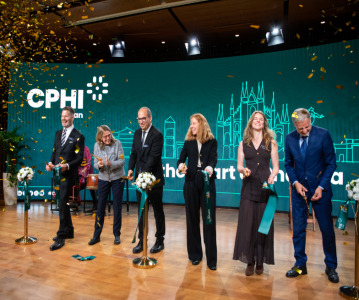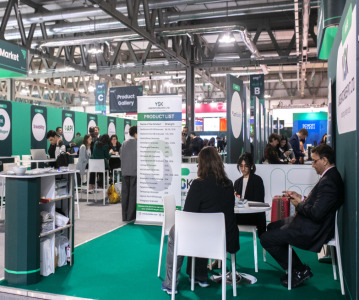Bio processing and manufacturing league table ranks US top and China bottom

US, Germany and Japan revealed as tier one nations in all categories with Sweden ranking the best of the rest.
bioLIVE – the new bioprocessing and manufacturing event running alongside this year’s CPHI Worldwide – announces the initial findings of the world’s first ever biopharma league table, which evaluates the reputations of major bio manufacturing countries across a number of characteristics (scored 1-10). This follows the launch of the small molecule pharma league table introduced last year.
Most surprising are the results of China – a nation that has seen a well-documented surge in both innovative biotech start-ups and bioprocessing and manufacturing companies – whose reputation in biologics is still far behind the more established players. China scored below 6 for ‘bio innovation’ and ‘quality of biological manufacturing’ – bottom in both respective league tables – suggesting perception here may lag behind reality.
bioLIVE expert, Dawn M. Ecker of BioProcess Technology Consultants, commented: “If we look at quality and innovation – both important attributes for advancing bioprocessing technologies – the US, Germany and Japan are ranked highest, followed by several other European countries, where biomanufacturing is a mature industry. China and India, both burgeoning markets for biologics, were not ranked as high for innovation. This perception may relate to the still developing biologics and bioprocessing industry in these regions, coupled with the knowledge of their existing reputations for mass production of generics.”
The full findings from 500 companies will be announced during bioLIVE in Madrid (October 9-11, 2018), with host nation Spain scoring just above 6 for all categories – significantly behind the other four major EU economies, as well as Ireland. In fact, recent training initiatives by Ireland’s NIBRT (National Institute for Bioprocessing Research) may be paying dividends as the country scored highly on ‘knowledge of bio professionals’ (7.2), and second only to Germany in terms of ‘growth potential’ (7.0) amongst EU countries.
Ecker, however, felt Ireland should have performed even more strongly. “Surprisingly, Ireland did not score as high as other European countries, despite the strong presence of biopharma manufacturing and the significant number of biomanufacturing facilities to be built here in the coming years. In this case, perception may be related to the increased demand for skilled staff, with not enough skilled staff to support the projected additional capacity growth”.
Overall, when performance across all categories is analyzed, the USA (7.88), Germany (7.49) and Japan (7.46) again appear as tier one nations – mirroring the results in small molecule manufacturing – with Sweden (6.95) and the United Kingdom (6.91), ranking as the best of the rest.
The most notable difference between small and large molecule rankings was amongst the performance of mid to high ranking countries with Sweden (6.95), Singapore (6.54), and notably, South Korea (6.69) – home of a growing biopharma sector including Samsung Biologics – performing comparably to France (6.72), Spain (6.51), Italy (6.55) and Ireland (6.81) in terms of biologics. India (6.31) and China (6.29) were adrift at the foot of the table – however, given the larger number of Indian participants in the survey data, India would finish behind China, if Indian participants were excluded.
Rutger Oudejans, Brand Director at bioLIVE added: “We are increasingly seeing a lot more bio professionals at CPHI and to announce the launch of our new bio processing and manufacturing event we wanted to explore what role reputation and perception may play. With bioprocessing and outsourcing set to rise quickly over the next few years, partnerships and investment decisions may well be impacted by the perceived status of nations verses the reality of their capabilities. We have also seen across all economies a shortage of qualified personal so certainly initiatives like NIBRT who are giving a couple of session at this year’s event will become increasingly important. Overall, our results suggest that whilst the US is clearly ahead, the majority of countries scored between 6 and 7, and it was very, very even. It suggests it’s a very level playing field in terms of business opportunities and that attendees at bioLIVE will be open to working with a very diverse supply chain.”
Related News
-
News WuXi to sell CGT manufacturing unit to US-based Altaris LLC
At the tail end of 2024, Chinese-based CDMO WuXi AppTec announced the signing of their deal with private equity firm Altaris LLC, confirming the sale of WuXi Advanced Therapies, the cell and gene therapy manufacturing arm of WuXi AppTec. -
News Women in Pharma: Our hopes for 2025 and beyond
Our last instalment for 2024 of the Women in Pharma series brings you messages direct from the Informa Markets CPHI team as they discuss the advice and insights they have carried throughout their roles working at CPHI, and what they hope to see for the... -
News CPHI Milan Wrap-Up Report: Conference Highlights
Discover the emerging and trending topics of the pharmaceutical industry with our CPHI Milan Conference Highlights, with exclusive insight from pharmaceutical leaders and experts! -
News BIOSECURE Act not included in key defense spending bill for 2025
On December 7, 2024, the Biden administration revealed the 2025 National Defense Authorization Act, an annual defense bill specifying the budget and expenditures of the US Department of Defense. The controversial BIOSECURE Act was notably missing from ... -
News Lessons from CPHI Milan 2024: Sunny Intervals for Pharma Manufacturing?
As the 2024 CPHI conference wrapped up in Milan, we caught up with L.E.K. Consulting – a global strategy consulting firm with deep expertise in pharma manufacturing – to discuss evolving market perspectives and business outlook. -
News Trump 2.0: What does the US election result mean for the healthcare industry?
After Trump won the Presidential election in the US in early November, we take a look at some of the implications a new Trump administration could have on the health and pharmaceutical industry, and on US patients. -
News Women in Pharma: Reflections from Behind the Scenes
In this instalment of our monthly series, the team that brings you the Women in Pharma series each month sits down for a heart-to-heart on what the series means to them, and how they hope to continue their work in the future. -
News Scaling the Industry: CPHI Scale-Up Market interview with YSK Laboratories
For the first time, CPHI Milan hosted the CPHI Start-Up Market, expanding support for emerging and small-sized enterprises in their transition to the next level of growth. In this interview, we spoke with Yuvansh Khokhani, Managing Director of YSK Labo...
Position your company at the heart of the global Pharma industry with a CPHI Online membership
-
Your products and solutions visible to thousands of visitors within the largest Pharma marketplace
-
Generate high-quality, engaged leads for your business, all year round
-
Promote your business as the industry’s thought-leader by hosting your reports, brochures and videos within your profile
-
Your company’s profile boosted at all participating CPHI events
-
An easy-to-use platform with a detailed dashboard showing your leads and performance

.png)





